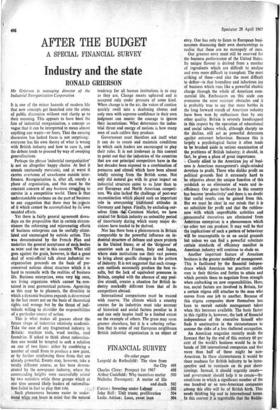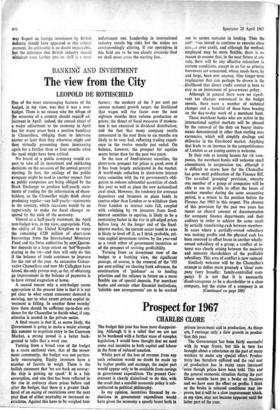Industry and the state AFTER THE BUDGET
A SPECIAL FINANCIAL SURVEY RONALD GRIERSON
Mr Grierson is managing director of the Industrial Reorganisation Corporation It is one of the minor hazards of modern life that new concepts get launched into the arena of public discussion without real clarity as to their meaning. This appears to have been the fate of industrial reorganisation, a concept so vague that it can be interpreted to mean almost anything one wants—or fears. That the ensuing discussion has lacked focus is not surprising: everyone has his own theory of what is wrong with British industry and how to cure it, and the debate tends to proceed by way of sweeping generalisations.
Perhaps the phrase 'industrial reorganisation' is not an altogether happy choice. At best it sounds unctuously messianic, and at worst it carries overtones of unwelcome outside inter- ference. Reorganisation is, after all, merely a phase of organisation, and this must be the constant concern of any business struggling to survive in a competitive world. There is thus understandable coolness on the part of business to any suggestion that there may be ,asisects of it which cannot be accomplished by its own unaided efforts.
Yet there is fairly general agreement dowa- days on the proposition that in certain circum- stances the reforming and rejuvenating efforts of business enterprises can be usefully -stimu- lated and encouraged by outside action. This was demonstrated by the French Plan and underlies the general acceptance of such, bodies as NEDC and the 1RC in this country. What still goes against the grain, however, is that a great deal of semi-official talk about industrial re- organisation proceeds on the basis of pre- conceived notions about structure which it is hard to reconcile with the realities of business life. Business enterprises, even very big ones, are living organisms which cannot be con- tained in neat geometrical patterns. Agonising as this may be to planners, the direction in which a dynamic business expands is determined in the last resort not on the basis of theoretical rights and wrongs but by the thrust of indi- viduals willing to shoulder the responsibilities of a particular course of action.
This is what makes all guesses about the future shape of industries relatively academic. Take the case of any fragmented industry in Britain: machine tools, wool textiles, steel foundries. If asked to think about rationalisa- tion one would be tempted to seek a solution on one of two lines: either by combining a number of small firms to produce a new giant, or by further reinforcing those firms that are already powerful. Events may, however, take a totally different course, as has been demon- strated by the newspaper industry, where the commanding heights were successfully seized by two outsiders while those groups which at one time seemed likely leaders of rationalisa- tion failed in fact to play that role.
Such phenomena become easier to under- stand syken one bears in mind that the natural , . tendency for all human institutions is to stay as they are. Change means upheaval and is accepted only under pressure of some kind. When change is in the air, the voices of caution quickly swell into a deafening chorus and only men with supreme confidence in their own judgment can muster the courage to ignore their incantations. What determines the indus- trial thrust and energy of nations is how many men of such calibre they produce.
Government must therefore ask itself what it can do to create and maintain conditions in which such leaders are encouraged to play their roles. It is not irrelevant in this context to point out that the industries of the countries that are our principal competitors have in the last decades been exposed to a combination of pressures and stimuli which have been almost totally missing from the British scene. Not only did natural gas with its great impact on industrial structure come to us later than to our European and North American competi- tors. We also lacked the challenge of post-war reconstiuction which played such an important role in overcoming traditional attitudes in Germany and Japan. Finally, by excluding our- selves from- th414.: Common Market, we have created for British industry an unhealthy period of uncertainty during which many major de- cisions have tended to be shelved.
Nor has there been a phenomenon in Britain' comparable to the powerful influence on in- dustrial structure of defence and space projects in the United States; or of the `clirigisme' of countries such as France, Italy and Japan, where state institutions use their vast powers to bring about specific changes in the pattern of industry. It is not suggested that such strong- arm methods necessarily produce the best re- sults, but the lack of equivalent pressures in Britain, coupled with the absence of any posi- tive stimuli, creates a situation for British in- dustry markedly different from that of its competitors abroad.
International comparisons must be treated with reserve. The climate which a country creates for its industries must take account of historical and social factors peculiar to it and can only inspire itself to a limited extent on the example of others. The grass may seem greener elsewhere, but it is a sobering reflec- tion that to some of our European neighbours British industrial organisation is an object of envy. One has only to listen to European busi- nessmen discussing their own shortcomings to realise that these are no monopoly of ours.
Our greatest envy must still be reserved for the business performance of the United States. Its unique flavour is derived from a number of ingredients which are difficult to analyse and even more difficult to transplant. The most striking of these—and also the most difficult to define—is that boundless and infectious joy of business which runs like a powerful electric charge through the whole of American com- mercial life. Enthusiasm on this scale can overcome the most resistant obstacles and it is probably true to say that more battles in the long forward march of American industry have been won by enthusiasm than by any other quality. Britain is severely handicapped in this respect by the operation of educational and social taboos which, although sharply on the decline, still act as powerful deterrents against extrovert behaviour. Because this is largely a psychological factor it often tends to be brushed aside in serious examination of the problems of British industry; it should, in fact, be given a place of great importance.
, Closely allied to the American joy of busi- ness is American management's single-minded devotion to profit. Those who dislike profit on political grounds find it extremely hard to be -objective about the unique function of this yardstick as an eliminator of waste and in- - efficiency. Our great battle-cry in this country has become 'productivity' and there is no doubt that useful results can be gained from this. But we must be clear 'in our minds that it is no substitute for profit and that the ruthless- ness with which unprofitable activities and pnsuccessful executives are eliminated from Anlierican enterprisek is a phenomenon which no other test can produce. It may well be that the implications of such a pattern of behaviour will be unacceptable to us on social grounds but unless we can find a powerful substitute certain standards of efficiency manifest in American industry will continue to elude us.
Another important feature of American business is the greater mobility of management. This is facilitated by the financial indepen- dence which American tax practices enable men in their thirties and forties to attain and which permits them to negotiate from strength when embarking on new responsibilities. Here, too, social factors are involved in Britain, for a certain stigma still attaches to the man who moves from one job to another. Because of this stigma companies show themselves less keen to recruit outside management talent when this becomes available. The basic factor in this rigidity is, however, the lack of financial independence of the executive himself who finds it unattractive in the circumstances to assume the risks of a less sheltered occupation.
An American magazine recently made the forecast that by the end of this century 60 per cent of the world's business would be in the bands of 200 international companies and that more than half of these might be non- American. In these circumstances it would be sheer madness for British industry to be intro- spective and to ruminate on its past short- 'comings. Instead, it should urgently create— and government should help it to create—the conditions in which a significant number of the one hundred or so non-American companies among this elite will be of British birth. This needs thinking big and in international terms. In this context it is regrettable that the Redda-
way Report on foreign investment by British industry should have appeared at this critical moment. Its arithmetic is no doubt impeccablo, but the inference that British industry should withdraw even further into its shell is a most
unfortunate one. Leadership in international industry entails big risks but the stakes are correspondingly alluring. If our operations in this field are to be too closely circumsc-ibed we shall never cross the starting line.







































 Previous page
Previous page